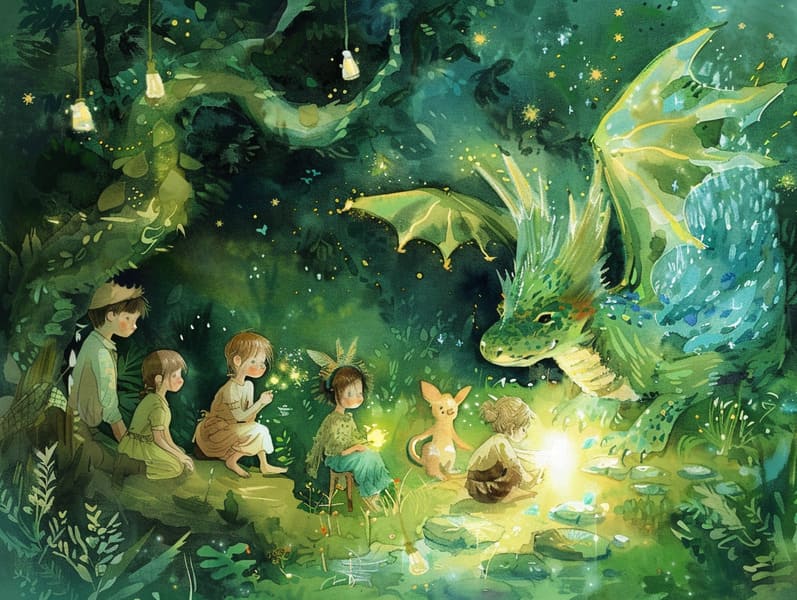
Nightfall is a treasured time for adults and their kids. It’s a chance to relax, hug close, and delight in the wonder of sleepy-time tales.
For generations, nightly tales for children have been a treasured legacy, offering more than just a way to rest. They provide an prospect for bonding, education, and fostering fantasy.
Significance of Bedtime Stories
Evening stories for little ones mean more than a way to end the day. They play a essential role in a child’s development and in nurturing the adult-child connection. Here’s why they are valuable:
1. Bonding Time: Telling bedtime tales develops a special time of affection between caregivers and children. It’s a moment of proximity that helps children feel appreciated and safe.
2. Vocabulary Building: Enjoying narratives helps children develop their communication skills. They pick up new terms, understand sentence structures, and refine their attention and interpretative skills abilities.
3. Fantasy and Imagination: Bedtime tales carry them to wondrous worlds, sparking imagination. They envision characters, settings, and adventures, which energizes their creativity.
4. Emotional Growth: Stories for little ones often feature characters facing problems and reactions. These tales help kids recognize and process their own emotions, building emotional growth.
5. Cognitive Skills: Absorbing a narrative helps children develop focus, recall, and critical thinking skills. They acquire to follow lines of thought, remember aspects, and anticipate results.
Making Stories a Bedtime Habit
Establishing a bedtime habit that includes narrating bedtime stories is easy and beneficial. Here’s how to establish a beloved part of your end-of-day tradition:
1. Find a Cozy Place: Opt for a peaceful place where you and your child can nestle in without interruptions. A relaxing bed or a relaxing reading nook works great.
2. Choose a Set Time: Fix a consistent time each night for tales. Regularity helps children predict and makes the habit easier to maintain.
3. Pick Stories for Their Age: Identify tales that suit your child’s maturity. Toddlers might be engaged by visual books with uncomplicated narratives, while bigger children may like novels with more involved stories.
4. Interact with the Story: Try to the tale be engaging by incorporating different accents and voices, adding effect sounds, and inviting your child to engage. Ask details about the story to keep them focused.
5. Create a Calm Atmosphere: Adjust the lights, use soft check it out voices, and create a tranquil environment to help your child ease into rest.
Finding Quality Bedtime Stories
There are countless choices where you can find great bedtime stories for children. Here are some places to look at:
1. Children’s Books: Look at your nearby library or bookstore to find a varied selection of bedtime stories for kids. Exploring the choices together can be a wonderful activity that also enables children to select stories that appeal to them.
2. Online Resources: There are many web resources that offer free bedtime stories. Sites like Storynory provide a variety of short stories for kids that you can access. These platforms are great for finding new and varied stories without fees.
3. Audiobooks and Apps: For nights when you’re too weary to read, look into audiobooks or storytelling apps. These can provide a relaxing voice to read your child a story, ensuring they still get their bedtime story fix. Apps often offer fun elements that can hold their focus further.
4. Personalized Stories: Create your own stories fitting your child’s interests. Personalized stories can be incredibly engaging and meaningful. You can bring your child in the development process, making them a part of the adventure.
Short Story Advantages
Brief stories for children are quite helpful for bedtime. They provide all the advantages of longer stories but are more concise, making them perfect for calming down before sleep. Here’s why short stories are a wonderful choice:
1. Straightforward: Short stories are direct and easy for kids to get, even after a long day. They can easily grasp the tale and enjoy the story without losing interest.
2. Immediate Attention: These stories rapidly engage children, grabbing their attention and interest. This makes them excellent for keeping bedtime habits manageable yet enjoyable.
3. Various Options: Brief tales create for variety in your bedtime books. You can select a different story each night, keeping the custom exciting and exciting for your child.
4. Time Efficiency: For busy parents, to-the-point tales are a easy way to verify children still get their nightly dose of storytelling. They fit well into a packed schedule while still offering the full positives of a bedtime story.
Why "Read Me a Story" is Magic
The simple phrase, “Will you read me a story?” can unlock a world of magic for children. Agreeing to this request not only addresses a child’s want for attention and engagement but also forms lasting moments. Here’s why it’s special:
1. Bond: Sharing stories to your child encourages a deep emotional attachment. It’s a time for closeness, sharing, and bonding.
2. Practice: Creating a bedtime story ritual creates a prized tradition that children enjoy every night. It’s a custom that can be given through generations.
3. Growing Together: As you tell stories, you’ll notice your child’s evolution and progress. Their responses, reactions, and understanding of the stories progress, offering insights into their developing minds.
4. Secure Place: Bedtime stories provide a safe space for children to explore emotions, face fears, and find comfort in the safe presence of a parent.
Finishing Thoughts
Kids’ bedtime stories are a valuable tool for growing a child’s growth and building unforgettable events of togetherness.